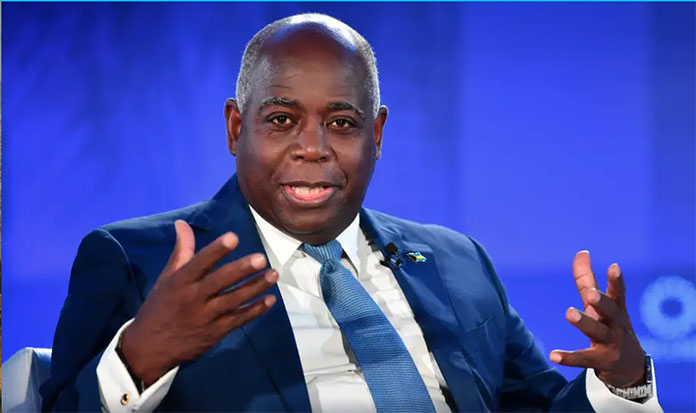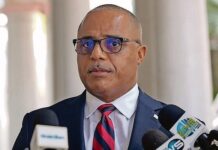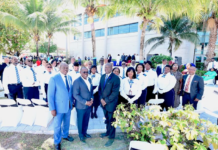
Good evening, and Happy New Year.
It is a joy and a blessing to be with you here tonight, at the University of The Bahamas, and to have the privilege of addressing Bahamians across the country at the start of this year.
We start the year full of renewed energy and commitment to serving our country and each other.
I am grateful for the opportunity to share news and reflections about the progress we’re making, and to make some significant announcements about the changes to come in the weeks and months ahead.
My Friends:
We are living through extraordinary times – times full of both peril and promise.
The challenges are evident.
Even as we work to address our country’s most difficult longstanding problems, we must confront new and modern challenges as well.
But this is also a time of exciting, game-changing new opportunities, if we are brave enough to embrace them.
I have never been more optimistic about what we can accomplish, and what kind of country we can build together.
We can cast off shackles that have held us back in the past.
Young Bahamians are on the cusp of opportunities and achievements their parents could scarcely have dreamed possible.
We are going to lean on the values, the traditions, and the history that make us special – even as we leverage new solutions and new technology to lift up a new generation, and to ensure dignity and security for all of our citizens.
Together, we can build an economy in which Bahamian talent is increasingly recognized and rewarded. An economy in which every year, more and more Bahamians have a major ownership stake. An economy for the many, not the few, in which all Bahamians can build their dreams, right here at home.
But I’m not going to sugarcoat reality – there aren’t any shortcuts between here and there.
You know and I know: the challenges and obstacles are real.
Yet think about how far we’ve come already. We pulled our country – and each other – out of darkness into light.
Just a little more than three years ago, our economy was in shambles.
Our nation’s finances were in freefall, and our hospitals, our schools, and our communities were in deep crisis.
We met that moment with determination – and when I say “we” – I mean all of us. Governments don’t rebuild by themselves – our country’s recovery is something we accomplished together.
From the start, we worked in partnership with all of you.
We said free testing and free masks made a lot more sense than curfews and lockdowns, and you proved us right.
We worked hard to promote our country, to revitalize tourism and to build new partnerships.
We pulled our country back from the fiscal brink.
We fought to get our country removed from the blacklist.
We brought back old jobs, and we created new ones.
And Bahamians embraced the opportunities generated, as employees, entrepreneurs and innovators.
Despite the good economic news, and even though the unemployment rate is the lowest since 2008, far too many Bahamians are still struggling.
So tonight, I want to focus specifically on how we can tackle one of our country’s most stubborn problems – the high cost of living that is such a major source of hardship and frustration.
In The Bahamas, prices have been too high for too long.
And on top of that – just as we emerged from the pandemic, we were hit with the worst global inflation crisis in more than 40 years.
A global, interconnected world means prices here at home can be affected by problems and conflicts thousands of miles away.
The pandemic, the war in Ukraine, conflict in the Middle East, a major drought which slowed shipping traffic through the Panama Canal – all have affected shipping and insurance costs, and therefore prices, around the world, including here at home.
I know that high prices exert a terrible pressure on families.
I know how stressful it is when there is more money going out than coming in, even when you are working hard.
When there is no way to pay all the bills that need to be paid.
The rising cost of food is one of the costs that has hit many families the hardest.
Even though inflation is now slowing, prices remain higher than many find reasonable or affordable.
And so tonight, I am pleased to announce a 50% reduction in the VAT rate on all food sold in food stores.
Beginning April 1st, the rate will be cut in half from 10% to 5%.
This new 5% rate will apply to all food in the food stores, including fresh fruits and vegetables, baby food, lunch snacks and frozen foods.
However, it will not apply to prepared foods in the deli..
This rate reduction will also apply to the importation of all items previously mentioned.
The effective date is April 1st in order to give merchants and foodstores time to make the necessary adjustments.
VAT is not the cause of the high price of food, but for those with the tightest disposable income, reducing VAT by 50% will make a difference.
This reduction will not impact our fiscal targets for this year.
You will remember how bleak things looked in the summer of 2021 – with all the talk of downgrades, currency devaluation and tax hikes.
In fact, some recommended at the time that our country raise VAT, from 12% to 15%, to bring it in line with our regional neighbours – because we have the lowest VAT in the region.
But we thought asking Bahamians just gaining freedom from curfews and lockdowns to pay more VAT on absolutely everything – across the board – would cause real hardship and slow our economic recovery, so instead we lowered VAT, from 12 to 10%.
Instead of going up to 15, as recommended, we went down to 10.
Since that time, we’ve worked really hard to improve our nation’s finances.
Now that we have put the economy onto a stable, secure footing, we are able to ease the VAT rate to provide financial relief.
Recently the IMF said that what we have achieved in bringing the economy back as quickly as we did was “remarkable”.
That is what we achieved together.
But the high cost of living means even Bahamians who are back to work are making a lot of hard choices, one after another.
Choices like, should I go home after work to take care of a sick family member, or take that second shift?
Choices you should not have to make.
The basics feel out of reach – not to mention buying a home, or building security for your future.
So many young people feel stuck, because they cannot afford to take the next step forward.
The same kind of work that once could meant a good life, a decent life plus a little more, now does not stretch to cover your monthly costs.
So, we need to address the underlying structural issues that have caused prices to be high for so long.
We have already started by creating our country’s first nationwide energy sector reforms.
The high cost of energy runs right throughout the economy.
Important parts of our outdated electricity grid date back to before Independence. Some of them are so old that no one makes the parts to fix them anymore.
But we can’t build a successful economy – and Bahamians can’t build their own success stories — if we continue to be burdened by an old, outdated, system, dependent on heavy and diesel fuels.
An unreliable system, and above all, an expensive system.
You simply can’t build a 21st Century economy with 20th century infrastructure.
So, we’re reforming, upgrading, modernizing.
Solar panels are going to go up, and prices are going to come down.
We are partnering with Bahamian companies across our Family Islands, to meet the unique needs of each.
We are going to have New Providence’s first utility-scale solar field.
We’re integrating LNG.
We’re updating transmission lines and technology, for efficiency – which means cost-savings – for reliability, and increased resilience during storms.
It’s a huge undertaking – and it’s going to make a huge difference.
But the changes will take time – so while that work is happening, we’re offering relief on high monthly electricity bills with an equity rate adjustment – a tariff reduction that has already added up to significant savings for thousands of Bahamian households and businesses.
In the coming months and years, imagine how many more Bahamian businesses will grow and thrive, once they are not held back by high electricity costs?
The huge increase in costs of housing has also helped to drive up the cost of living.
We’re building affordable housing, and we are piloting a Rent-to-Own programme.
But while these are important, they aren’t reaching enough Bahamians yet.
So even as we work to expand those efforts, we’re exploring ways to incentivize the private sector to build more.
Increasing the supply of housing is the best way to see reductions in the cost of housing. We have also expanded concessions to first-time homeowners, because it’s so hard to make that big leap.
In health care, we established a Catastrophic Health Care Fund.
When we came to office, we found an enormous backlog of Bahamians waiting for urgent cardiovascular, urological, eye care and orthopaedic surgeries by specialists.
To date, hundreds of Bahamians have been able to have these life-changing and in some cases, life-saving surgeries, which they could not have otherwise afforded.
41,000 Bahamians now receive their medications free of charge, and we are negotiating with The Pan-American Health Organization, PAHO and manufacturers to bring down prices for everyone else.
We know that every cost saving helps.
We put free Wi-Fi in our parks.
We expanded the housing allowance for teachers, and increased school uniform assistance for students.
We have signed an historic 33 labour agreements – many of which had been expired for years.
We cleared the backlog of promotions in the public service.
We implemented a minimum wage increase, even when some argued it was unrealistic.
The minimum wage isn’t high enough yet, but we’re moving in the right direction.
Some of our policies to help ease the high cost of living also serve additional policy goals.
Consider our School Breakfast Programme.
We’ve already served more than 230,000 free hot breakfasts to our schoolchildren.
This has improved school attendance, and helps our children begin their day ready to learn.
It also helps families save at the food store.
Our agriculture policies also serve multiple goals.
When we can grow more of what we eat, we will be less dependent on expensive imports.
We are also seeing the growth of a new entrepreneurial sector for the economy.
That’s why we’re pioneering innovative agriculture programmes and grants, to support active and aspiring farmers.
We are also launching a new Agriculture & Marine Cadet Programme, to provide hands-on training and mentorship.
Because of our remarkable economic recovery, our GDP has grown by 31.4%.
And we reduced our deficit from 13.1% to 1.3% — in three years, we knocked more than one billion dollars off our deficit!
These are things we should all be proud of.
A stronger economy is ultimately good for us all.
From the start, our goal has been to shift more of the tax burden to those who can best afford it.
That required a number of steps, including new legislation.
For example, we introduced corporate income tax for multinationals with more than 750 million euros in annual revenue who operate in The Bahamas.
This is the first time ever that a tax like this has been imposed here.
Instead of adding major new taxes on Bahamians, we organized ourselves to collect much more of the VAT already owed by larger companies.
We are improving real property tax compliance, but we have exempted more Bahamian property owners than ever before. The net result is increased revenue and a net reduction in property tax arrears.
We are hopeful that the reduction of VAT on food items will help reduce some of the pain when you pay for your groceries.
One of the biggest reasons for the high cost of living in The Bahamas is a lack of competition.
When competition is weak, or if companies have a monopoly in a certain market, businesses can charge whatever they like.
When there’s competition, customers have more choices.
They have more choices about where to shop and what to buy.
Competitors can offer cheaper prices to entice customers, and businesses soon realise that the way to succeed is by becoming more competitive.
In order to strengthen competition, we will shortly be engaging in a consultative period prior to introducing legislation to prohibit anti-competitive practices.
By promoting competition, the legislation will seek to enhance consumer welfare and protection through lower prices, remove unfair trading practices, and secure better products and services and a wide range of choice at the best possible prices.
In order to help Bahamians shop around to find the best prices, we are also launching a new ‘Price Comparison App’ to help consumers easily compare prices between retailers.
The app will initially focus on the food sector, but is planned to extend across a number of sectors.
On the current timetable, we expect to have the app up and running by the end of the first quarter of 2025.
When people have more information, they can make the choices that suit them best.
And when people have more choices, they can in turn make decisions that are right for them and their families.
Another major policy which we are rapidly moving towards full implementation is, our ‘Trade Diversification Policy’.
You may have already heard something about this initiative while the programme was being put together at the end of last year.
Up to 90% of goods consumed in the Bahamas are imported, and 85% of those are from the United States.
Historically, The Bahamas has relied heavily on a limited number of trading partners. While these relationships have served us well, the global market is constantly evolving.
In the same way that we wish to promote wider choice amongst retailers, we wish to offer a wider choice of places from which we source our products.
By diversifying the places from where we source our products, we not only reduce risks associated with supply chain disruptions, we can also cut costs associated with unnecessary middlemen.
In some cases, for example, where we import goods from the US, some of those products originate from other countries, then get shipped to the American wholesalers, who pay to clear US customs, before shipping a second time to The Bahamas.
Same products, of the same quality.
If we import the same products directly from their countries of origin, we could cut out some, if not all, of the middleman activity, thereby importing at a lower price.
The effort to bring down the cost of living, will be an ongoing effort on our part.
The status quo just doesn’t work.
In the past I have spoken about the principle of Economic Justice.
If you train hard and work hard, you should be able to reap the rewards from that.
You shouldn’t have to struggle to make ends meet.
Friends:
In the same way that we have worked in partnership to recover the economy, now more than ever we need that partnership to thrive.
2025 holds great promise for our country and for our future.
God has blessed us and continues to bless us.
And as we move forward throughout the year, I pray God’s special blessings upon each of you.
Thank you.







